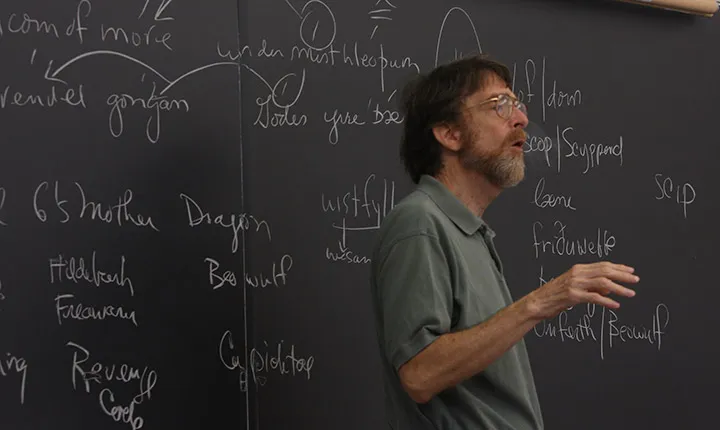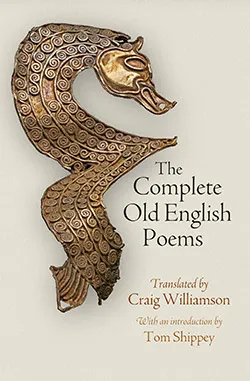Everything Old (English) Is New Again

When Craig Williamson made the decision to tackle something no one else had ever done before—translate every known Old English poem into modern alliterative, strong-stress verse—he faced two fears. The first was that someone else would beat him to it.
“The other thing I worried about,” the Alfred H. and Peggi Bloom Professor and Honors Program coordinator laughs, “is that I would drop dead before I finished.”
Happily, Williamson translated the 32,000 surviving lines in about a decade—growing so adept that he was completing 50 lines a day at his creative peak. This February saw the release of the 1,248-page, gold-ribbon-bookmarked The Complete Old English Poems (University of Pennsylvania Press): his sixth book, and one that will live for the ages.
“It is cause for celebration to have at last a translation of the entire Old English poetic corpus, moreover a rendering that is discerning, nuanced, and poetically crafted,” says noted medievalist R. D. Fulk. “The earliest English verse has never been such a delight to read.”

Over the course of his work, Williamson, whose distinguished publications include his 2011 translation of Beowulf and Other Old English Poems and his Hobbit-inspired riddles for Hollywood, grew so immersed in the spirit and song of his medium that he went from conscious crafting to unconscious creation.
“It’s a little bit mystical—at a certain point I actually felt that I had invited the Old English poets to my spiritual and linguistic realm and offered them my modern tools,” he says. “I was going one way on the bridge, they were coming the other, and we met at a certain point.”
Some of the more vivid characters Williamson brings to life in The Complete Old English Poems include Guthlac, who annoys the hell-decamped demons who happen to be living on the hillside he chooses for his hermitage; Andrew, who encounters Jesus in disguise as a scripture-ignorant sea captain; and the True Cross itself, which relates its journey from innocent forest tree to site of the crucifixion.
In fact, all the lives and treasures that Williamson has made available in this volume illuminate the ancient Anglo-Saxon world and the curiosity, humor, and awe with which its denizens viewed it. Via bawdy riddles, magical and medical charms, lyric and epic poetry, he offers a fresh and far-ranging take on what it means to be human—at any point in time.
“Studying another culture through its poetry you begin to see, ‘this is like me,’ ‘this isn’t like me’—it’s another whole way of seeing ourselves,” Williamson says. “That’s what I love so much about these poems: as much as they tell us about the poet’s world, they tell us about ours, too.”
To make sure that these voices and verses would be available and affordable in one volume to modern audiences—to scholars and general-interest readers alike—Williamson drew upon the Constance Hungerford Faculty Support Fund and offered to waive his royalties.
“I told my editors that I’m not interested in making money on this book. I just want to make sure it’s available for people to read,” he says. “This is an Old English mindset: Dragons hoard treasure and are far the worse for wear for doing so. Instead, you want to establish a reputation by doing something that people will remember.”
“Nobody in the past 200 years—let alone centuries before that—has ever translated all these Old English poems, let alone into modern poetry. Something unusual has been done here, something faithful and beautiful.”
“It’s the most significant, important book I’ll ever do,” he adds. “A dragon might swallow it all anyway, one day, but it is going to live for a long time.”
“Now,” he laughs, “I have to find something else to do.”
Below, Williamson reads and then translates about 20 lines of Beowulf during a 2011 honors seminar.



